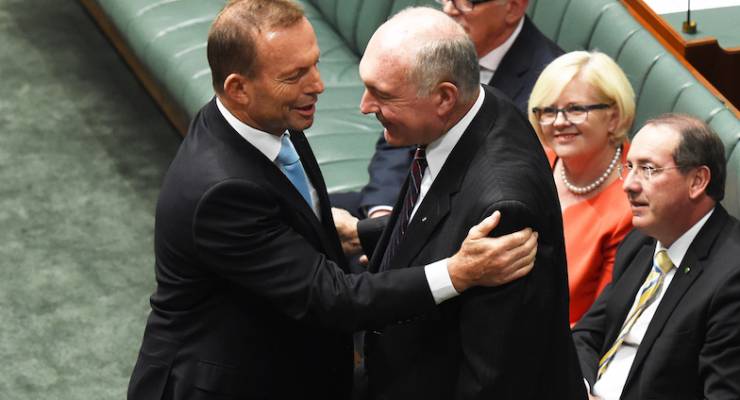
“It basically means they are giving favours to their friends.”
That’s how Monash University senior law lecturer Dr Yee-Fui Ng describes the revelation than 40% of the Abbott-era MPs who left politics were appointed to government jobs.
It’s a surprisingly high figure that reflects a lack of integrity in the application process, she told Inq, and raises questions about whether favouritism or cronyism was behind the appointments.
While many MPs left Canberra to tread the well-worn path into corporate riches, an Inq analysis reveals an even larger number found new and fruitful careers on the public purse, including at the powerful Administrative Appeals Tribunal (AAT) and on lesser-known government boards like the Australian Rail Track Corporation (Warren Truss).
University of Melbourne politics lecturer George Rennie said the high number of government appointments suggested many people were being put into jobs that they were not necessarily qualified to do.
“It’s not just that they’re not the best person for the job, it’s that they’re not a good fit for the job at all,” he said.
This was especially problematic, Ng said, when it came to appointments on government tribunals like the AAT, which made decisions that affected peoples’ lives.
“These positions hold great responsibility. Tribunal members decide on the fate of hundreds of thousands of people in relation to their visas. They have statutory responsibility. A merit-based process is much more appropriate than just appointing friends or colleagues,” she said.
Labor has been accused of gifting well-paid jobs to former MPs too. The Queensland Labor government was criticised last year when it appointed former deputy prime minister and treasurer Wayne Swan to the board of government-owned energy company Stanwell Corporation.
Cronyism is hardly new in politics, but this all comes at a time when faith in the political process is critically low.
One improvement in transparency would be to have appointments that require a bipartisan vote in parliament, rather than being a direct appointment. Another option, Ng said, would be to set up a commission that appointed people independently.
“An independent body that sits apart from government would be a better model,” she said. “Otherwise there’s no transparency.”
Centre Alliance Senator Rex Patrick said while it was unfair to expect politicians never to work again after leaving politics, it was a problem when ministers left parliament and immediately took up a role in a related field, or when parliamentarians were appointed to taxpayer-funded position in a process that is not competitive.
“These two situations give rise to, in both cases, a further decline in the confidence held by the public into serving politicians and, in the second case, inappropriately qualified people being appointed to important public positions,” he said.








“An independent body that sits apart from government”…..but who appoints the members to sit on that “independent” body?
‘Welcome to the AAT. We provide independent merits review…’ (The opening words from the AAT’s website.)
These crony appointments illustrate that not only do we crucially need a Commonwealth Corruption Commission, we need clearer rules for that Commission to police. Given what we know so far about Christian Railway Porter’s design for a Commonwealth Corruption Commission, neither of those things are going to change unless the Labor Party grows a spine and a clear policy on political ethics and a policy for an effective transparent corruption commission and wins the next election. That, regrettably seems unlikely.
Labor has to grow a greater, more expansive vision for the nation and an articulate enunciation of that vision. And realise that short term factional myopia is a handicap.
Labor has a great history of say ,PBS ,Medibank , State education, public housing ,etc ..But is that Labor history these days ? Where is the public for it ? Maybe Labor need their own monopolized media of tv/radio & print ?
I despair that anything will ever change. We constantly hear about corruption, cronyism and patronage in federal and state politics and yet I don’t see how we can change things. Neither party will support a federal icac except when they’re in opposition, because they both benefit from it – so threatening to vote them out doesn’t particularly worry them. Nor do our aspirational citizens seem to be particularly concerned as long as they’re getting a piece of the pie.
“It’s not just that they’re not the best person for the job, it’s that they’re not a good fit for the job at all,” puts it all in a nutshell.
They’re not about good governance at all – they’re not interested in either beneficial outcomes for the greater good or the bigger picture : they’re more interested in what a position can be milked for in the short term. An extrapolation of the short-term view of the way they govern…..
Labor did have a vision for the betterment of the country, namely their former manifesto which read, Government control of the means of production, distribution and exchange.Not necesarially total ownership, but control to curb the worst excesses of the private sector.
It’s true that politics is a fleeting career, and they have to think of their families future after politics.
It seems that until someone inside shames the current crop into doing the right thing nothing will change
Were is Mark Latham? (Just Kidding)